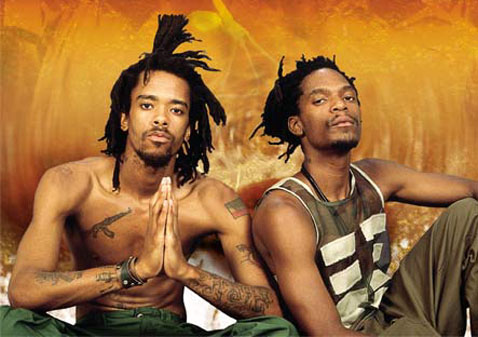

Washington, D.C.'s Constitution Hall is on fire tonight. After the quick dimming of the arena's lights, the packed venue takes on a new life. Photographs of Assata Shakur, Bob Marley and the Black Panthers are being projected onto the stage, triggering an emotional response.
The hypnotic rhythm of an accelerated heartbeat swallows the audience whole. Ba-boom, ba-boom. Bruce Lee, ba-boom, Malcolm X, ba-boom, Biggie and Tupac. The heartbeat comes to a sudden stop, giving way to an alarming gunshot. M-1 and Stic.man make their way onto the stage. "Where my African people at?" shouts M-1, proudly waving a red, black and green flag. The crowd responds loudly and affirmatively.
There's something historically significant about witnessing two brothers dipped in fatigues, spitting Black nationalist rhetoric on the mic, gracing the very same stage Black opera singer Marian Anderson was once prohibited from playing. A D'Angelo concert might not be the first place one would expect to find black fists in the air, but with Dead Prez opening for the soul brother on the last leg of his tour, you should expect nothing less. After all, the essence of both of their sound hails from the same soul womb.
Dead Prez's lyrical gift of gab plays like a soundtrack to the African experience in America; be it the daily hustle to survive in the midst of injustice or the search for unconditional love. It was this strong connection that compelled D'Angelo to personally request Dead Prez to open up for him. "It's a new audience but people have been very responsive," says M-1. "It's been love."
Their debut, "Let's Get Free," reads like a thoroughly comprehensive letter addressed to the world. On this anthem for revolution, both MCs ppenned their views on self-determination, racism and health until there was no more ink left. Over grimy beats, Dead Prez's politicized brand of hip-hop serves edutainment at a time when the only lessons MCs are providing are courses in nihilism.
"All that 'bling bling' sh*t comes from Black people not having nothing," Stic.man says. "We ain't never had sh*t. People say these rappers aren't talking about nothing, but that comes from the generation and the class before that talked about pulling yourself up by your bootstraps. This whole, 'I got to get my hair done, my nails and get my suit just to fit in with the crackers...' If we want to have diamonds or gold, I'm not promoting that, 'cause I don't know what we're gonna do with it but wear it. Let's have things that are beneficial to us, like land.
Growing up poor (Jamaican-born M-1 in Brooklyn and Stic.man in Tallahassee, Fla.) the duo fully understood the importance of things with permanent value. In 1990, M-1 headed to Tallahassee to attend FAMU (Florida Agricultural and Mechanical University) where he and Stic met and connected due to their mutual love of music and knowledge. "I was soaking up the Black Panther Party as a whole," M-1 remembers. "I learned about their lives and it helped mold me."
"I realized there's a struggle already going on and I have to try to help ride it out," interjects Stic.man. M-1's quest for insight led him to join the National People's Democratic Uhuru Movement in Chicago for three years while Stic.man remained behind in Florida and started getting into trouble. Burned out by the arduous labor of Uhuru, M-1 decided it was time to do that music thing and Stic.man agreed.
Dead Prez transcribed the political education they acquired into lyrical poetry. Brand Nubian's Lord Jamar discovered them in New York and helped them sign a deal with Loud Records. But being the new kids of the block on a powerhouse label like Loud (home to the Wu-Tang Clan and Mobb Deep) wasn't easy. Dead Prez wasn't always Loud's priority but that didn't stop them from building a fan base around their over-the-top performances. (They've been known to ignite dollar bills and toss apples into the audiences, declaring they eat healthy).
While most of their peers concern themselves with materialism and hedonism, Stic.man and M1's music makes them hip-hop generation freedom fighters. But despite their personal politics, Dead Prez doesn't feel that their music should be taken as preachiness or misconstrued by those who would attach labels to it. "I don't see our music like it's some message," says Stic. "We're just laying down our experiences. In the Sixties, it wasn't called a message, because that's what people were dealing with. We focus on our community. It ain't like we have some message to preach."